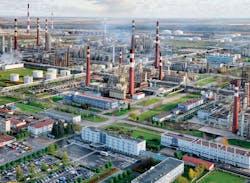Russian refinery lets contract for grassroots delayed coking complex
Surgutneftegas PJSC subsidiary LLC Kirishinefteorgsintez (KINEF) has let a contract to Lummus Technology LLC to supply equipment for construction of a new delayed coking complex at the operator’s 20.1-million tonnes/year (tpy) refinery in Kirishi, Leningradskaya Oblast, Russia.
As part of the contract, Lummus will design and supply two proprietary fired heaters for implementation in the new complex that will be used to convert heavy oil residues—which otherwise would end up in fuels—into valuable lighter products, the service provider said on Oct. 5.
This latest contract for the planned grassroots delayed coking complex complements KINEF’s previous award in 2018 to Chevron Lummus Global (CLG)—a Chevron USA Inc.-Lummus Technology JV—to license CLG’s proprietary delayed coking technology for the project, Lummus said.
Lummus did not reveal further details regarding either the equipment supply contract or the earlier technology award to CLG, which appears to have been publicly undisclosed until now.
While KINEF has yet to disclose proposed capacities or specific units to be included in the proposed delayed coking—or heavy oil residue refining—complex, Surgutneftegas confirmed in its latest annual report to investors that KINEF in 2020 began preparing for implementation of the project, which included completion of preliminary site works as well as selection of licensors.
In a separate release dated Dec. 31, 2020, Vadim Evseevich Somov—KINEF’s director general—said construction of the new complex would begin a new stage of technological development for the refinery, forming part of the operator’s ongoing and phased modernization of its refining processes to improve production quality, reduce operating costs, ensure health and safety, and protect the environment.
In December 2013, KINEF’s Kirishi refinery completed construction of a grassroots advanced oil refining complex (AORC) that has since allowed the manufacturing site to produce more than 2 million tpy of ultralow-sulfur Euro 5-quality diesel and kerosine, as well as an additional 600,000 tpy of feedstock for production of high-octane gasoline, according to the operator’s website.
Equipped with flexibility to operate for maximum production of diesel, kerosine, or both depending on market conditions, the AORC’s main unit—the atmospheric residue deep conversion plant—includes the following unit capacities:
- Vacuum distillation, 4.9 million tpy.
- Hydrocracking, 2,9 million tpy.
- Visbreaking, 1.9 million tpy.
- Hydrogen production, 112,000 tpy.
The AORC also includes a 570,000-tpy wastewater recovery and sour water stripping plant, as well as an associated 75,000-tpy Klaus sulfur recovery plant that produces granulated sulfur with a hydrogen sulfide content below 0.001%.
About the Author
Robert Brelsford
Downstream Editor
Robert Brelsford joined Oil & Gas Journal in October 2013 as downstream technology editor after 8 years as a crude oil price and news reporter on spot crude transactions at the US Gulf Coast, West Coast, Canadian, and Latin American markets. He holds a BA (2000) in English from Rice University and an MS (2003) in education and social policy from Northwestern University.

